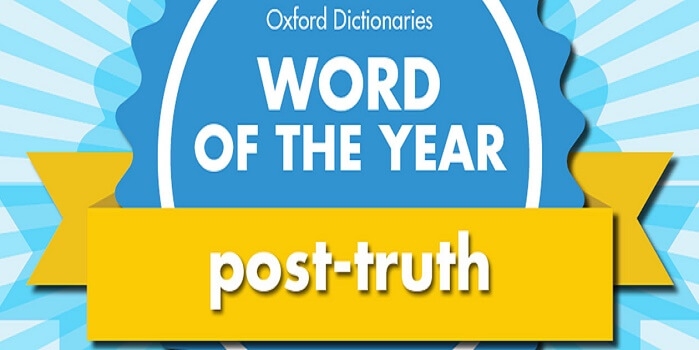
Oxford Dictionaries has declared “post-truth” to be its international word of the year, 2016. The word was largely influenced by the politics of Donald Trump and Brexit.
Defined by the dictionary as an adjective “relating to or denoting circumstances in which objective facts are less influential in shaping public opinion than appeals to emotion and personal belief”, editors said that use of the term “post-truth” had increased by around 2,000% in 2016 compared to last year. The spike in usage, it said, is “in the context of the EU referendum in the United Kingdom and the presidential election in the United States”.
Oxford Dictionaries’ word of the year is intended to “reflect the passing year in language”, with post-truth following the controversial choice last year of the “face with tears of joy” emoji.
Advertisement
The publisher’s US and UK dictionary teams sometimes plump for different choices – in 2009 the UK went for “simples” and the US for “unfriend”; in 2006 the UK went for “bovvered” and the US for “carbon-neutral” – but this year teams on both sides of the Atlantic chose the same word.
How technology disrupted the truth
Contenders for the title had included the noun “alt-right”, shortened from the fuller form “alternative right” and defined as “an ideological grouping associated with extreme conservative or reactionary viewpoints, characterised by a rejection of mainstream politics and by the use of online media to disseminate deliberately controversial content”.
First used in 2008, its use “surged” this spring and summer, said the dictionary, with 30% of usage in August alone.
Advertisement
Brexiteer was also in the running for the crown, along with non-political terms including coulrophobia, the fear of clowns, and hygge, the Danish concept of cosiness.
But the increase in usage of post-truth saw the term eventually emerge ahead of the pack.
“We first saw the frequency really spike this year in June with buzz over the Brexit vote and Donald Trump securing the Republican presidential nomination. Given that usage of the term hasn’t shown any signs of slowing down, I wouldn’t be surprised if post-truth becomes one of the defining words of our time,” predicted Oxford Dictionaries president Casper Grathwohl.
“It’s not surprising that our choice reflects a year dominated by highly-charged political and social discourse. Fuelled by the rise of social media as a news source and a growing distrust of facts offered up by the establishment, post-truth as a concept has been finding its linguistic footing for some time.”
According to Oxford Dictionaries, the first time the term post-truth was used in a 1992 essay by the late Serbian-American playwright Steve Tesich in the Nation magazine. Tesich, writing about the Iran-Contra scandal and the Persian Gulf war, said that “we, as a free people, have freely decided that we want to live in some post-truth world”.
Report by The Guardian


